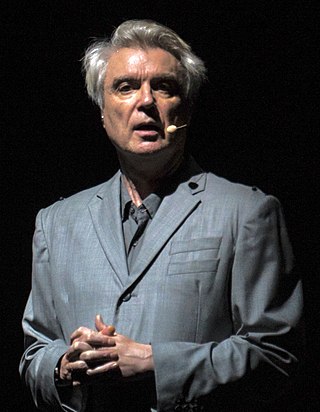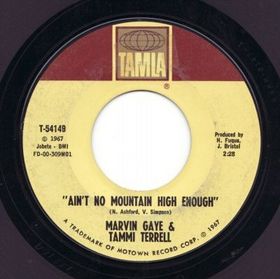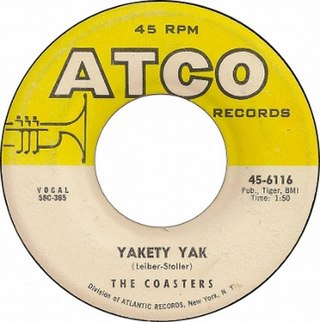
Talking Heads were an American rock band that formed in 1975 in New York City. The band was composed of David Byrne, Chris Frantz (drums), Tina Weymouth (bass) and Jerry Harrison. Described as "one of the most critically acclaimed bands of the '80s," Talking Heads helped to pioneer new wave music by combining elements of punk, art rock, funk, and world music with an anxious, clean-cut image.

David Byrne is a Scottish-American singer, songwriter, musician, record producer, actor, writer, music theorist, visual artist, and filmmaker. He was a founding member, principal songwriter, lead singer, and guitarist of the American new wave band Talking Heads.

Sly and the Family Stone was an American band originating from San Francisco, California. Active from 1966 to 1983, they were pivotal in the development of funk, soul, R&B, rock, and psychedelic music. Their core line-up was led by singer-songwriter, record producer, and multi-instrumentalist Sly Stone, and included Stone's brother and singer/guitarist Freddie Stone, sister and singer/keyboardist Rose Stone, trumpeter Cynthia Robinson, drummer Greg Errico, saxophonist Jerry Martini, and bassist Larry Graham. The band was the first major American rock group to have a racially integrated, mixed-gender lineup.

Charles Edwin Hatcher , known by his stage name Edwin Starr, was an American singer and songwriter. He is best remembered for his Norman Whitfield-produced Motown singles of the 1970s, most notably the number-one hit "War".

Fear of Music is the third studio album by American rock band Talking Heads, released on August 3, 1979, by Sire Records. It was recorded at locations in New York City during April and May 1979 and was produced by Brian Eno and Talking Heads. The album reached number 21 on the Billboard 200 and number 33 on the UK Albums Chart. It spawned the singles "Life During Wartime", "I Zimbra", and "Cities".

Tom Tom Club is an American new wave band founded in 1981 by husband-and-wife team Chris Frantz and Tina Weymouth and as a side project from Talking Heads. Their best known songs include the UK top 10 hit "Wordy Rappinghood" and the US top 40 hit "Genius of Love", both from their 1981 debut album, and a cover of The Drifters' "Under the Boardwalk" that reached the UK top 30.

"Ain't No Mountain High Enough" is a song written by Nickolas Ashford & Valerie Simpson in 1966 for the Tamla label, a division of Motown. The composition was first successful as a 1967 hit single recorded by Marvin Gaye and Tammi Terrell, and became a hit again in 1970 when recorded by former Supremes frontwoman Diana Ross. The song became Ross's first solo number-one hit on the Billboard Hot 100 chart and was nominated for the Grammy Award for Best Female Pop Vocal Performance.

"Roll Over Beethoven" is a 1956 hit song written by Chuck Berry, originally released on Chess Records single, with "Drifting Heart" as the B-side. The lyrics of the song mention rock and roll and the desire for rhythm and blues to be as respected as classical music. The title of the song is an imperative directed at the composer Ludwig van Beethoven to roll over out of the way and make room for the rock and roll music that Berry was promoting. The song has been covered by many other artists, including the Beatles and the Electric Light Orchestra. Rolling Stone magazine ranked it number 97 on its list of the "500 Greatest Songs of All Time".

"This Must Be the Place (Naive Melody)" is a song by new wave band Talking Heads. The closing track of its fifth studio album Speaking in Tongues, it was released in November 1983 as the second and final studio single from the album; a live version would be released as a single in 1986. The lyrics were written by frontman David Byrne, and the music was written by Byrne and the other members of the band, Chris Frantz, Tina Weymouth and Jerry Harrison.

"Genius of Love" is a 1981 hit song by Tom Tom Club from their 1981 eponymous debut album. The song reached number one on the Billboard Disco Top 80 chart, and was performed by Talking Heads in the 1984 concert film Stop Making Sense.

"Walk On By" is a song composed by Burt Bacharach, with lyrics by Hal David, for singer Dionne Warwick in 1963. The song peaked at number 6 on the US Billboard Hot 100 and number 1 on the Cash Box Rhythm and Blues Chart In June 1964 and was nominated for a 1965 Grammy Award for the Best Rhythm and Blues Recording. Isaac Hayes recorded the song five years later, in 1969, and reached number 30 on the Hot 100 chart and number 13 in the R&B charts with his version. "Walk On By" has since charted numerous times in various countries, with wildly different arrangements.

"Burning Down the House" is a song by new wave band Talking Heads, released in July 1983 as the first single from their fifth studio album Speaking in Tongues.
"Take Me to the River" is a 1974 song written by singer Al Green and guitarist Mabon "Teenie" Hodges. Hit versions were recorded by Syl Johnson, Talking Heads and Delbert McClinton. In 2004, Al Green's original version was ranked number 117 on Rolling Stone magazine's list of the Rolling Stone's 500 Greatest Songs of All Time.

"Old Time Rock and Roll" is a song written by George Jackson and Thomas E. Jones III, with uncredited lyrics by Bob Seger. It was recorded by Seger for his tenth studio album Stranger in Town. It was also released as a single in 1979. It is a sentimentalized look back at the music of the original rock 'n' roll era and has often been referenced as Seger's favorite song. The song gained renewed popularity after being featured in the 1983 film Risky Business. It has since become a standard in popular music and was ranked number two on the Amusement & Music Operators Association's survey of the Top 40 Jukebox Singles of All Time in 1996. It was also listed as one of the Songs of the Century in 2001 and ranked No. 100 in the American Film Institute's 100 Years...100 Songs poll in 2004 of the top songs in American cinema.

"Yakety Yak" is a song written, produced, and arranged by Jerry Leiber and Mike Stoller for the Coasters and released on Atco Records in 1958, spending seven weeks as #1 on the R&B charts and a week as number one on the Top 100 pop list. This song was one of a string of singles released by the Coasters between 1957 and 1959 that dominated the charts, making them one of the biggest performing acts of the rock and roll era.

"One Nation Under a Groove" is a 1978 song by Funkadelic, the title track from their album of the same name. It has endured as a dance funk classic and is probably Funkadelic's most widely known song. "One Nation Under a Groove" was Funkadelic's first million selling single, as well as the third million selling single for the P-Funk organization overall.

"Turn On Your Love Light" is a rhythm and blues song recorded by Bobby Bland in 1961. It was an important R&B and pop chart hit for Bland and has become one of his most identifiable songs. A variety of artists have recorded it, including the Grateful Dead, who made it part of their concert repertoire.

"Funkin' for Jamaica (N.Y.)" is a song by jazz trumpeter Tom Browne. The single—a memoir of the Jamaica neighborhood in the New York City borough of Queens where Browne was born and raised—is from his second solo album, Love Approach. Browne got the idea for the song while he was at his parents' home. The vocals for the single were performed by Toni Smith, who also helped compose the song. The song hit number one on the US Billboard R&B chart for a month. "Funkin' for Jamaica" peaked at number nine on the dance chart and made the top 10 on the UK Singles Chart, but it never charted on the Billboard Hot 100.

"Cities" is a single, released in 1980, by the American new wave band Talking Heads. It is the fourth track on the 1979 album Fear of Music.



















